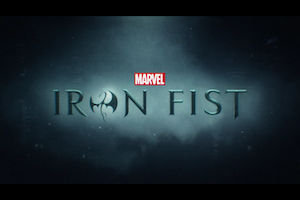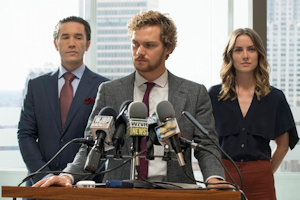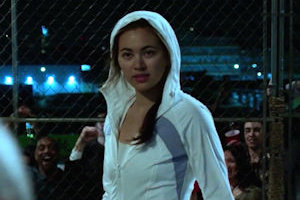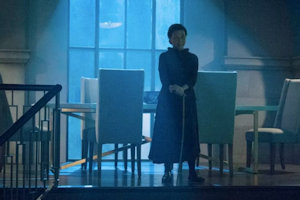TV Review: Marvel's Iron Fist, Season 1
 | | Iron Fist |
The last solo series to be introduced before the team-up mini-series later this year, Marvel's Iron Fist has a lot to live up to. Daredevil set a high bar with its gritty comic book realism, deep symbolism, thematic structure, stellar acting, and incredible choreography; Jessica Jones proved that the same structure could weave a noir-like narative that is more psychological horror than comic book; and Luke Cage managed to be both fun and timely in its social relevance. Compared to those three shows, it's easy to see why Iron Fist is considered something of a failure (currently, it has a dreadful 18% on Rotten Tomatoes), but does it deserve the critical lambasting it is receiving?
The story of Danny Rand--a lost child of billionaires who has spent fifteen years under the tutelage of magical monks from another dimension--was the hardest of the upcoming Defenders to crack for a modern audience sold on the semi-realistic style of the Netflix Marvel shows. At least the showrunners were wise to wait until after Doctor Strange debuted in the Marvel Cinematic Universe, but even with the budding Sorcerer Supreme in the canon, the comic book craziness of the Immortal Iron Fist is hard to put side-by-side with the street level heroes that precede him. If that were the only complaint to be had about the show, however, it would be easy enough to overcome with a well-constructed series driven by character and an eye for exciting drama.
In some respects, the show does manage to do just that. The characters are tightly constructed; the drama feels earned; and the action beats are pretty good, if not as jaw-dropping as Daredevil's now famous hallway fight or the Punisher's brutal prison battle. It also only bounces on the surface of the more comicky elements of the story, avoiding showing things like Shau-Lao the Undying (a straight-up dragon) or anything more than the outer rim of the otherworldy K'un-L'un. This is a strength and a weakness, however, because while it keeps the show from turning cartoonish, it also makes it feel embarrassed of its own plot. On top of that, it forces the story to relegate almost everything about Danny Rand's backstory to exhausting exposition. For the first several episodes, it is difficult to get a handle on the main character, and his motives for arriving in New York are never adequately explained, nor are his motivations for doing just about anything he does before he learns of the Hand.
 | | The cast is excellent all around |
The Hand, though, represents a wholly separate flaw in the story. Whereas the first seasons of Daredevil, Jessica Jones, and Luke Cage all had well-defined and larger-than-life villains (some of the best villains in all of the MCU), the first season of Iron Fist never settles on an antagonist; it changes from episode to episode, and characters are constantly bouncing back and forth between friend and foe. There is no real Kingpin, Kilgrave, or Cottonmouth (yeah, I know Luke Cage switches antagonists halfway through--as does the second season of Daredevil--but that's just once, not a dozen times) to represent a foil for the hero. At the risk of spoilers, the final episode tries earnestly to make the case that one single villain has been pulling the strings all along (fans of the comic know who), but that case is weak at best, especially when the villain is overshadowed by an enormous army of magical ninjas.
Going forward, however, into both The Defenders and this show's future seasons, I imagine a lot of the villain problems will fall by the wayside. This season does set up one of Iron Fist's greatest foes in an exciting way, and the primary character arc for Danny ensures that he will never again be as naïve as he is this season. There's even a pretty cool cliffhanger in the final moments that promises to clarify Danny's purpose.
The non-villainous side characters are also handled in such a way that their motivations and allegiances should be far clearer in the future than they are here. Probably the most important of these characters is Colleen Wing, an incredible kung fu fighter who can stand toe-to-toe with Danny, even though she lacks his superpowered fist. She is Danny's primary love interest--both in the show and in the comics--and their relationship goes through the ringer intensely enough that it would be hard to see how it would change much in their continuing adventures. There are also the morally ambiguous sibling figures of Ward and Joy Meachum, who are tested in many ways and come to an understanding with Danny in different ways. Ward Meachum is portrayed as an awful human being throughout most of the show--he's an alpha-male jerk with daddy issues and a massive drug addiction--but even he comes around by the end.
 | | She's quite the badass |
As for Danny Rand himself, Finn Jones does an excellent job portraying a character who didn't have a traditional adolescence or journey to adulthood. He knows enough about the world to function, but lacks basic street smarts and social cues. He's not just a lost manchild, though, as Jones also embues Danny with a warm serenity and Krishna-esque whimsy to mask the inner turmoil of a character who doesn't quite fit in either of his two worlds. He doesn't brood or show reluctance the way the other Defenders do, and that gives him a unique and interesting character, even though most of his backstory remains hidden. Jones also shows an impressive amount of skill as a fluid and graceful fighter.
Where I think the story is strongest, though, is not in its comic book insanity, its kung fu set pieces, its fantastic characters, or its acting: it is in its portrayal of corporate ethics and the political intrigue that comes with it. As the lost son of the multinational über-corporation Rand Enterprises, Danny quickly takes a position of ultimate authority, where his business naïveté and idealism threaten to ruin the company. You understand and empathize with Danny's point of view, even as the men and women who oppose his plans are portrayed as acting rationally rather than as mustache-twirling corporate boogiemen. Danny himself realizes the folly of his flawed business instincts, and it makes for a much stronger story that deals in real world realities rather than preachy moral certitude. In a time where one percenters are typically treated as the root of all evil in pop culture, it's nice to see a little nuance for a change.
The plot is, in a word, intricate. The weave is tight, however, and there aren't many loose threads to pull that would reveal any major plot holes. This is praise-worthy, and it is fun trying to unravel the complex ins and outs of a story that rarely lets you get good footing. The characters react to this deeply layered puzzle in unpredictable but consistent ways, with writing that relies less on convenience than the similarly plot-heavy Jessica Jones (where one ancillary character just happens to have superpowers of his own halfway through the first season). Unfortunately, there isn't much of a hook to get audiences started, and the first few episodes get bogged down by all the set-up and exposition. On the other hand, the pace of the show goes in only one direction, and by the end, it's marching at maximum tempo. Other Netflix Marvel shows have the opposite problem--getting bogged down and slow near the end--but Iron Fist is only boring at the beginning, before audiences are given many reasons to care.
 | | There are, naturally, a few crossover characters |
The problems with Iron Fist are real, but perhaps its biggest problem is the inevitable comparison to its predecessors. Taken on its own, it's a perfectly good comic book show, despite its flaws. It's fun, well-acted, and competently written. It could be compared favorably to DC's Arrow, a show it has a hell of a lot in common with. Where I firmly disagree with some of its harshest critics is on the subject of its wider social implications. I've seen several reviews (most notoriously over at Vox) that are unable to find enjoyment in a show where the main character is a wealthy white male with a skill set "culturally appropriated" from Eastern philosophy and martial arts. This is, in my humble opinion, nonsense, revealing more bigotry in the critics than in the show they are denigrating.
Therefore, I can only think of three main reasons you wouldn't enjoy Marvel's Iron Fist: (1) you don't like comic book stories; (2) you want Iron Fist to be as good, if not better, than the other three Netflix Marvel shows; or (3) you're so blinded by SJW rage that your entertainment must be filtered through so many layers of safe spaces and trigger warnings that you probably can't enjoy anything fun. For everyone else, I recommend Iron Fist. It's flawed, sure, but it's also an exciting, entertaining step towards The Defenders. Keep your expectations in check and your politics at the door, and you'll have a good time with it.
FINAL SCORE:





While not as successful as the other Netflix Marvel shows, lacking in a singularly memorable villain, and weighed down by an exposition-heavy first few episodes, the first season of Iron Fist is an entertaining, well-acted, and tightly plotted series that benefits from patience and an open mind.
|
-e. magill 3/24/2017
|
|